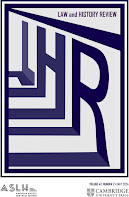[We have the following announcement, from
a press release from
Notre Dame Law. DRE.]
With the financial support of the American Society for Legal History, Notre Dame Law School and the University of Notre Dame Graduate School will host the ASLH/Notre Dame Graduate Legal History Colloquium during the 2024-2025 academic year.
Dennis Wieboldt, a joint J.D./Ph.D. student in history, is spearheading the forum. Associate Dean Randy Kozel and Professor Christian Burset have worked with Wieboldt to launch the colloquium at Notre Dame next year.
The initiative is currently accepting applications from prospective presenters and commentators. Students and faculty members are encouraged to indicate their interest in presenting, commenting, or attending the colloquium here.
The convenings will be held on the Notre Dame Law School campuses in Chicago and South Bend in October and November of 2024, and then again in February, March, and April of 2025. Participants will also be able to join convenings of the colloquium virtually.
The forum will provide budding legal scholars and practitioners with feedback on works-in-progress—an important step in fine-tuning research to a point where it can be submitted for publication. “As the federal judiciary increasingly turns its attention to ‘history and tradition,’” Wieboldt noted, “it is crucial for future leaders in the legal profession to develop the skills necessary to employ historical methodologies and make historically informed claims about the meaning of legal texts.”
“Notre Dame is an excellent place to think seriously about the role of history in contemporary legal practice,” Wieboldt added. “I am excited to welcome students and faculty from other institutions to engage in conversation with members of the Notre Dame community.”
The ASLH/Notre Dame Graduate Legal History Colloquium is open to master’s and doctoral students as well as law students. Students will have the opportunity to present works-in-progress at convenings of the colloquium, and each work-in-progress will have a designated faculty or peer commenter. All works in progress will be pre-circulated to prospective attendees to facilitate a robust discussion.
[And here is more from
the registration form.]
Please note that all convenings of the Colloquium will occur on the Notre Dame Law School campuses in South Bend, Indiana, and Chicago, Illinois, from 10 AM to 2 PM local time. All presenters, commenters, and attendees will receive complimentary lunch and refreshments. For those who are unable to attend convenings of the Colloquium in-person, virtual participation opportunities will be available.
The scheduling information provided in this form is subject to change to accommodate presenter and commenter schedules. The preferences you express will inform the Colloquium's final schedule, which will be made available during the summer. Once dates and locations are finalized, prospective presenters and commenters will have the opportunity to confirm their availability before the schedule is released publicly.
For further information about the Colloquium, please visit
here. If you have any questions, please contact Dennis Wieboldt at dwiebold@nd.edu.


















